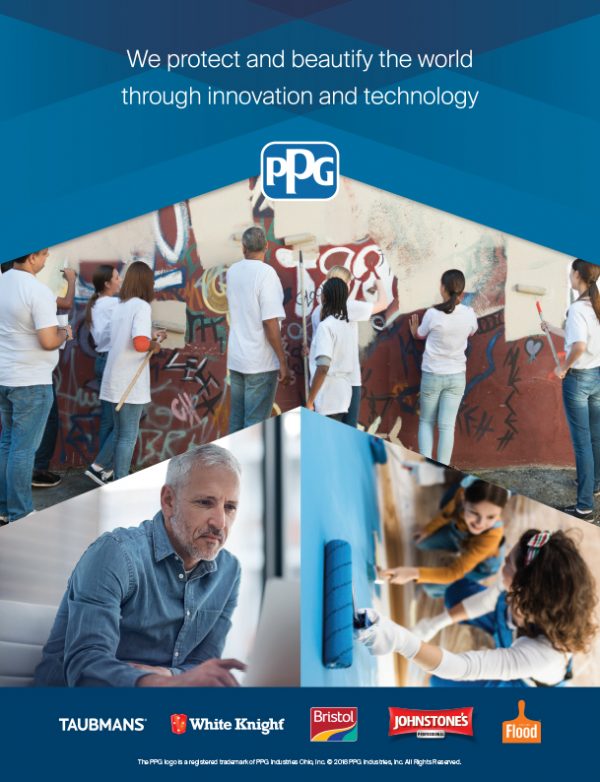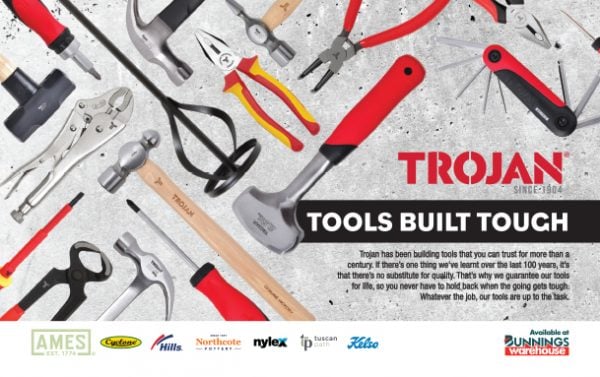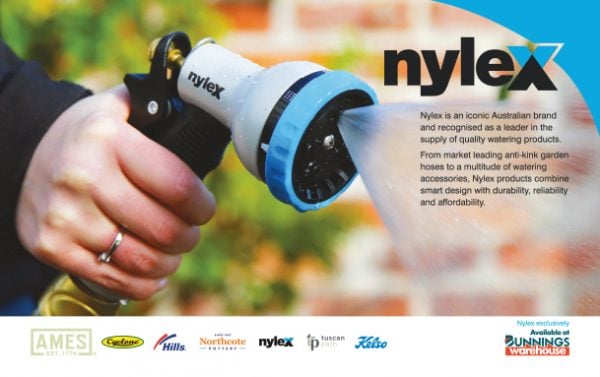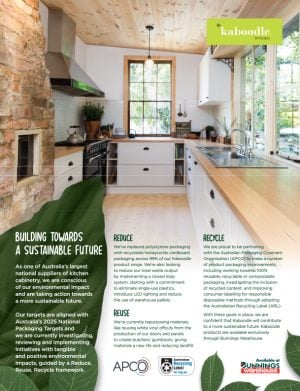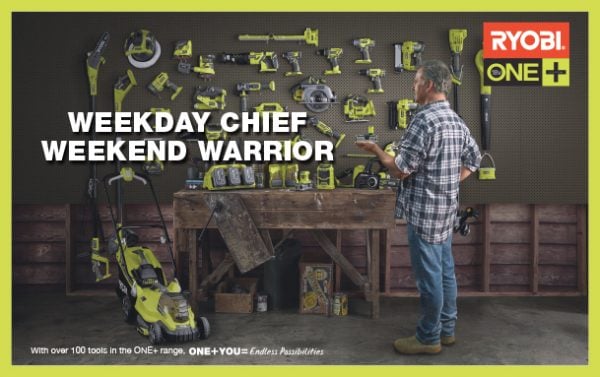A chat with Michael Schneider is a bit like having a yarn around an Aussie barbie. You bond automatically over common ground, a topic you can easily discuss. Maybe it’s the way the snags are being cooked, the weather, or an observation about the hopeful mutt hovering around for a sausage.
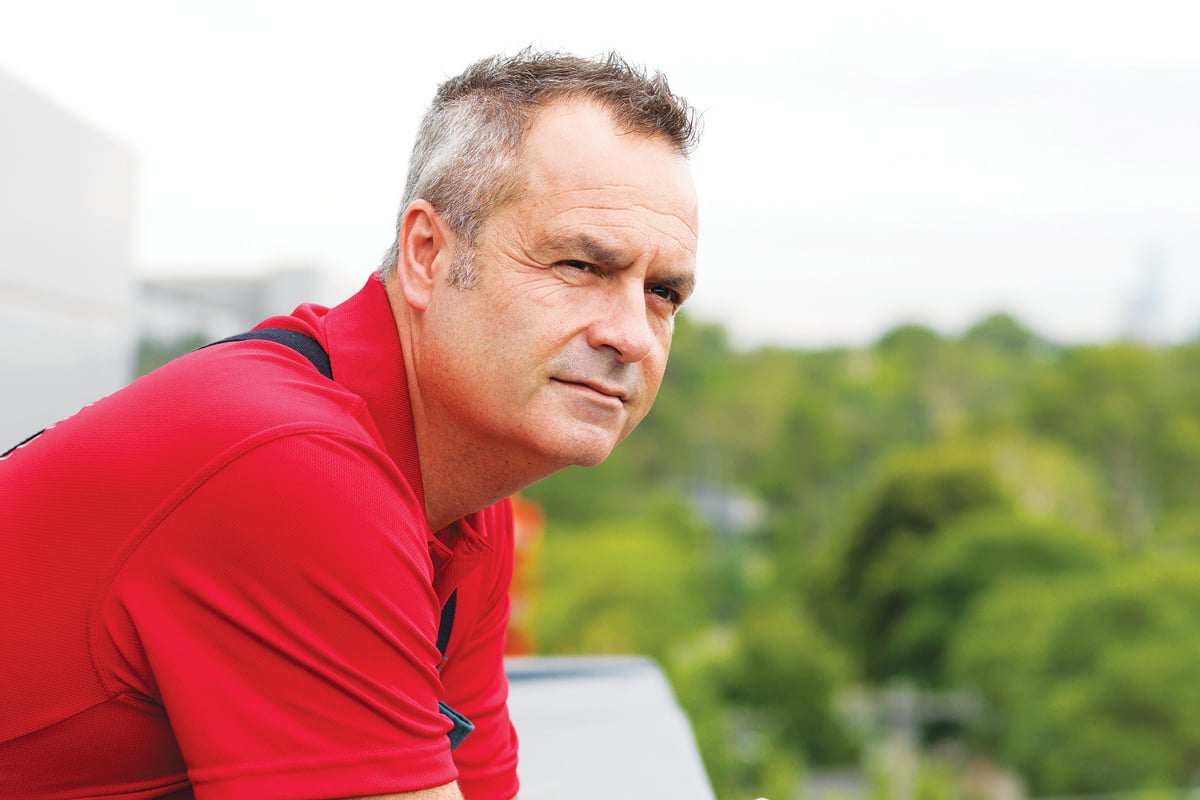
With Michael the conversation inevitably turns to Bunnings, not because this writer is a regular at the homeware stores – in fact, she’s rather intimidated by its vast collections of everything you could ever possibly need for the house and garden – but because, whether you venture inside a store or not, Bunnings is a feel-good household name throughout Australia and New Zealand.
In his role as Managing Director of Bunnings Group, the first thing that strikes you about Michael is his warmth – the same easygoing nature of the Bunnings ‘reds’, the men and women dressed in their natty red shirts framed by forest green aprons who serve us in one of Bunnings’ 380-plus warehouses, stores or trade centres.
There’s no pretence, no spin; what you see is exactly what you get. And what you get is a glimpse of the 15-year-old casual who fell in love with retail while working his first job at Target in Sydney’s north.
“I started while still at school as a Thursday night and Saturday casual in Chatswood, pushing trolleys, punching check-outs and doing night fill for general merchandising,” he remembers.
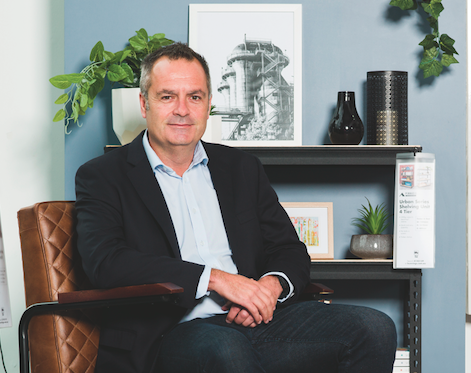
“It led to supervisory roles and then an offer of a management traineeship. “I was at uni studying arts with the hope of becoming an English and history teacher, and my manager made me, for all the right reasons, stay committed to my studies, even though I realised not long into my degree I had no passion for it. I had already found a passion in retailing, juggling my management traineeship part-time until I graduated and joined Target full time.
We’ve got a very relaxed office environment and are 100% open plan.
Michael spent six years with Target working across numerous stores, including Dubbo, Parramatta, Roselands and Liverpool.
In 1995, he accepted a role as Branch Manager at Westpac, admitting that while he knew nothing at all about managing a bank, he was more than qualified to help the bank introduce more leadership in proactive retail and customer service.
He moved on to senior roles in human resources and retail banking before being appointed Small Business Markets State Manager of Perth, Adelaide and Melbourne.
However, while he was grateful for the experience and the “unbelievable” opportunities afforded him by the bank, he was missing the thrill of retail.
“I remember Christmas time in Melbourne’s Bourke Street Mall,” he reflects. “The banks were all winding down, but the stores were alive, people were everywhere and there was so much buzz with everyone shopping. I realised I just wasn’t doing what I was passionate about.”
In 2000, Michael joined some former Westpac colleagues at discount department store chain, The Warehouse Group, transitioning into the role of Regional Operations Manager responsible for more than 40 sites in Victoria and South Australia.
Once again he was driving better retailing disciplines, before returning to Sydney where he combined his operational experience and human resource expertise to take on the role of General Manager Operations and Human Resources.
“However, the company’s ambitions weren’t lined up with its capabilities, and the decision was made to sell the business,” Michael explains.
“Restructuring meant a lot of change, a lot of people moving out and stores closing. That wasn’t for me; I was more about growing careers and building businesses than ‘shrinking’ them, so I started to look around for something else.”
Michael’s ‘look around’ didn’t last long, and very soon he found himself making what he thinks is the best decision of his life. “That was joining Bunnings in 2005 as State Operations Manager NSW and ACT,” he reveals.
“We had just 40 or 50 stores back then in New South Wales, whereas it’s more than 90 stores now. Two years later, I moved to Melbourne to be General Manager of Operations, which covered every store around Australia.
“I joined Bunnings with no aspirations to becoming managing director. I joined to continue building my retail experience, provide for my family and pay a mortgage – very unexciting reasons really.
But over time, it developed into a career that has been absolutely amazing.” In 2016, it was “all systems go” when Michael was appointed Managing Director of the Bunnings Group.
Today, heading a company that attracted A$13.1 billion in revenue last year, he leads 46,000 team members employed across 273 Bunnings warehouses, 74 smaller stores and 31 trade centres.
There’s nothing in our business that I’d ask any team member to do that I’m not prepared to do myself.
The business has been built on the three simple, but very effective pillars – lowest prices, widest range and best service – to market and sell its 45,000 products, a vast supply ranging from gardening equipment to lighting, from heating systems to building materials, and from bathroom products to kitchens.
To keep its promise of low prices, Bunnings will offer a further 10% discount if a customer discovers they can buy a product cheaper elsewhere on the same day.
Meanwhile, shoppers also have access to an even larger range of home and lifestyle products via MarketLink, a service introduced last year that enables retailers approved through Bunnings’ trusted sellers program to sell their products direct to customers via the Bunnings website.
Bunnings’ service doesn’t just end with the sale. Installation services, from ceiling fans and clotheslines to toilets, along with product assembly for products such as barbecues, play equipment and wardrobes are available.
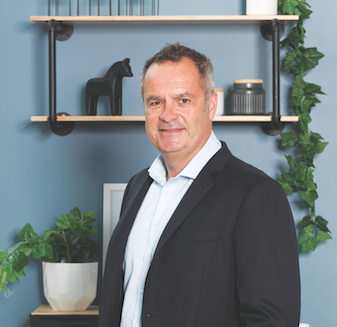
Instore workshops also regularly offer lessons in craft, woodwork, water and energy saving, along with DIY classes catering to women and children.
But it’s the ‘reds’ on the floor, with their exceptional ‘no worries’ demeanour, who shine, putting the most frustrated customer at ease over the DIY job they’ve been catastrophising over.
More than 80% of Bunnings’ staff are in permanent part-time or full-time roles, a deliberate strategy Michael believes is proof of the company’s investment in long-term relationships.
Casuals are not forgotten either, having the benefit of being able to accrue personal or carer’s leave, a rather striking anomaly in the retail world.
“Our bias towards permanent, over casual, roles means our team members can put down their roots and grow,” Michael explains. “Our labour turnover is very, very low. In fact, we’ve probably got industry-leading retention rates. We’re very lucky.”
But perhaps the biggest factor when it comes to Bunnings’ staff is its renowned commitment to older workers. Nearly a third of its workforce is aged over 50, a demographic Michael welcomes on board, and one that he says “brings a really lovely balance to the team”.
“We even have a couple of team members in their late 70s and early 80s. Many have finished their career as a horticulturalist, carpenter, builder or electrician and bring their skills with them, which not only benefits our customers but our other team members as well.
“Our buyers also do an amazing job travelling the world, identifying great products, while those in the marketing team do an incredibly good job explaining features and benefits to customers. Meanwhile, our property team is brilliant at finding amazing sites and building them while our store development teams fit them out.”
“What we are very disciplined on is cultural fit. We want our teams to give customers the confidence to do the job around their home or garden themselves and we want them to feel great about it. I think I can work out whether someone is a Bunnings person just by walking down the street talking to them, seeing the way they connect and engage. That would be enough to see whether they would fit very easily with us.”
Despite having been with Bunnings for 15 years, Michael regards himself as a relative newbie, unable to compare with others who’ve been with the company for multiple decades.
His own leadership team comprises colleagues boasting over 35 years’ experience, a long service considered quite normal at Bunnings and a vital contribution to the company’s strong culture.
“Our longest-serving team member in our Claremont store in Western Australia has been with us for more than 60 years,” he says.
“But of course, we’re always in the market for new skills as well, which is evident when you look at our digital and data analytics journey that now offers about 80% of our range online, Click & Collect services and MarketLink.”
However, as much as Michael is in the top job overseeing business and operations, he’s never strayed far from what he loves most, pleasing customers and developing teams as enthusiastic about retail as he is.
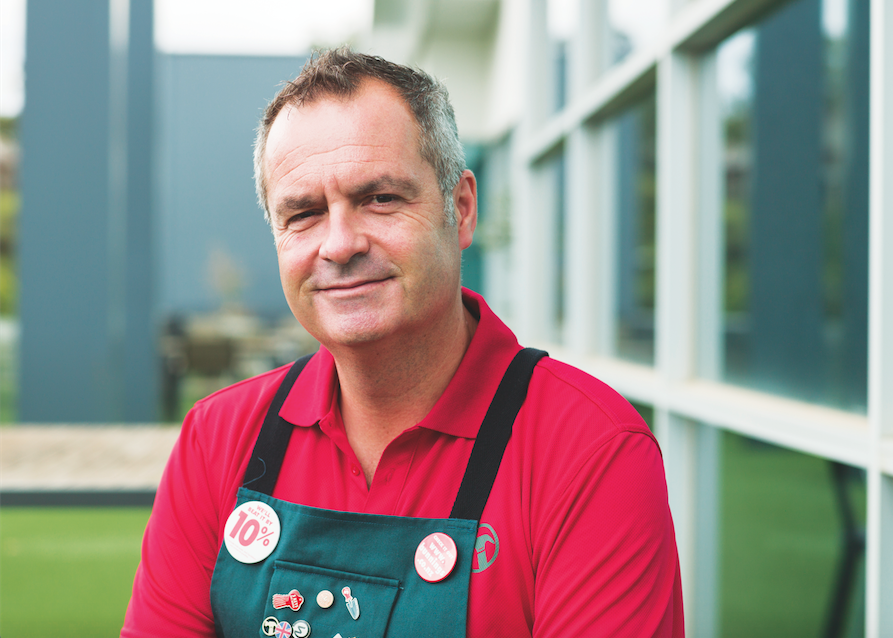
He’s not averse to pitching in and giving a hand, particularly if it means throwing on some jeans, the red shirt and green apron and getting out onto the floor. “It’s one of my favourite things to do,” he admits.
“I’m probably not as useful as the team might like me to be, but I’m very enthusiastic. I shocked some team members one day while shooting a video, sharing ideas and business updates for our team. There was a pallet right in the middle of where we wanted to shoot so I just grabbed the pallet jack and moved it. I think some of the team were shocked that I not only knew what the jack was but I also knew how to use it. It was the right thing to do and I just did what had to be done. There’s nothing in our business that I’d ask any team member to do that I’m not prepared to do myself.”
And that includes occasionally manning the iconic Bunnings sausage sizzle and cake stalls, a much-loved weekend event that raises money for community projects.
The first was held 25 years ago at Bunnings Sunshine Warehouse in Melbourne and, since then, thousands of community groups have raised millions of dollars for local causes.
In January, Michael was visiting Adelaide to watch the road cycling stage race, Tour Down Under, with his younger son Luke, a casual employee of Bunnings.
Aware the race coincided with the second Bunnings bushfire relief barbecue, the pair packed their ‘reds’ so they could ditch their lycra and head off to the Mile End store to flip snags for a couple of hours.
Apart from raising money, it was a chance to pay tribute to more than a hundred Bunnings workers who were members of various services committed to fighting the fires.
After his shift on the barbecue was finished and while Michael was wandering around the store, he pitched in again to help a customer.
“He needed a hall runner carpet cut from our rolls and there was no-one else to do it,” he explains.
“So I found the right knife and safety gloves and started cutting away. The observation from the customer was a bit telling when he said, ‘You don’t do this very often.’ But we got there in the end.”
There’s no doubt Michael enjoys the fact that he can engage with customers without them having a clue about his role, and he readily admits that his instinct to help, while not being acknowledged as the boss, is important to him.
“Part of me is still the 15-year-old casual from Target who just wants to muck in and help people,” he explains.
“If you had not met me, didn’t know what I looked like and I was in a store in my reds, in my apron, there’s no way you’re going to know I’m the Managing Director and someone else isn’t.
“I’m always bemused by retailers and businesses that have these subtle hierarchical elements, where people dress a certain way or do something differently. Our uniforms are all exactly the same.
“We’ve also got a very relaxed office environment and are 100% open plan. We get our own coffees in the cafe and sit and chat with other team members, and I really enjoy the fact that our team can reach out directly.”
The company extends that sense of rapport to its local communities, offering an extraordinary range of assistance to hundreds of services.
Schools and kindergartens are prime examples, with Bunnings involved in activities ranging from gardening to sustainability programs.
A popular one is the partnership with the Australian Museum and its FrogID program, in which 170 Bunnings’ stores have built a pond in 140 schools to not only provide frogs with safe homes, but raise awareness of their role in the environment.
Other programs include assistance to returned servicemen and women, senior citizens and local organisations such as Men’s Sheds, Scouts Australia and Rotary.
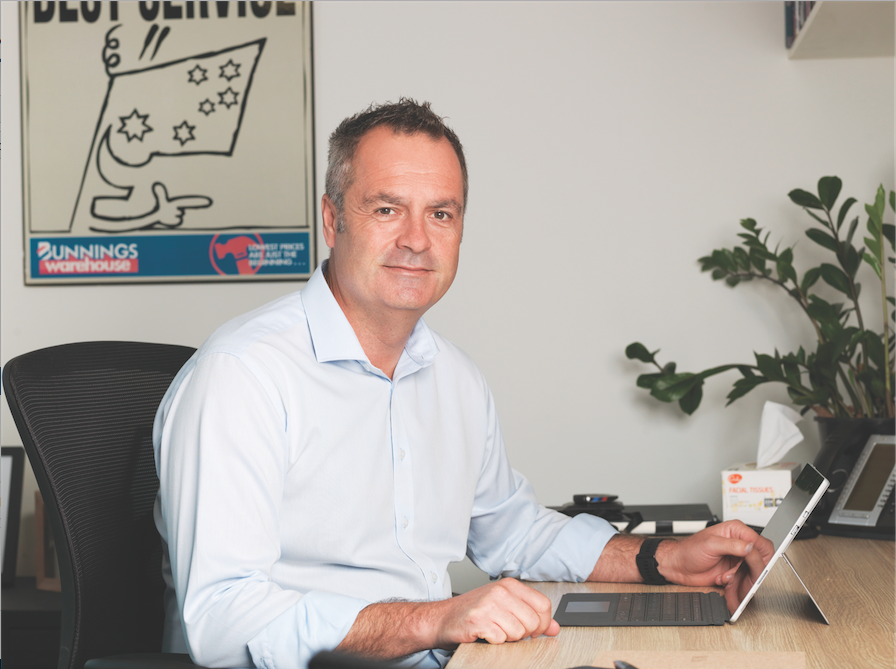
In fact, Bunnings supported more than 90,000 activities throughout 2019 to raise more than A$49 million for community groups throughout Australia and New Zealand.
Among them were more than 26,000 activities held in rural and regional communities, where an impressive A$13 million was raised.
The only result perhaps more impressive is the humble sausage sizzle, which raised more than A$38 million for community groups.
Meanwhile, stores have been retrofitted with energy efficient LED lighting, electric vehicle charging stations are being introduced and instore recycling programs have been expanded for paint, batteries, power tools and appliances.
It’s a vital aspect considering last year’s figures, when 27 Paintback events hosted by Bunnings in locations across Australia collected more than 200 tonnes of waste paint.
If it was a case of point scoring, over 5,800 kilograms of batteries have been collected from 13 Melbourne stores during 2019, with more than 26,000 kilograms dropped off by customers since 2009.
As a shopper, Michael prefers to head to the painting, gardening and barbecue sections in Bunnings.
Describing himself as “novice to intermediate” when it comes to DIY skills, he admits that while he can fix certain things, he’s more inclined to rely on his sons or professional tradies to get the job done.
“I’m very handy around the garden, doing the lawns and hedges, but not much beyond that,” he says.
“I’m always interested in the latest products, though, and do like the barbecue section for that. We’ve expanded our range from your standard gas and charcoal barbecues to smokers, which slow cook meat, and rotisseries, which create a more European feel to your barbecuing, and there’s the latest in cleaning products and accessories to explore. I’m always interested to see what our team brings to market.”
COVID-19 impact on Bunnings
Fortunately, because more than 80% of Bunnings staff are permanent part-time or full-time, jobs have mostly been maintained throughout COVID-19. Casual workers were also largely protected by Bunnings’ unique policy allowing them to accrue personal and carer’s leave. However, one casualty was the beloved sausage sizzle, which was suspended in March. In a remarkable gesture of goodwill, the company donated $500 gift cards to community groups forced to cancel in an investment of more than A$1.7 million across Australia and New Zealand. Other instore activities were also cancelled, including Easter and Mother’s Day Family Nights, school holiday workshops and trade breakfasts. Necessary restrictions on products were also introduced with a maximum of one item per customer for generators, gas bottles, respirators or face masks, fuel cans, methylated spirits and turpentine implemented. Meanwhile, all 53 of New Zealand’s Bunnings stores were opened to trade customers only after the government’s restriction on non-essential services.
Naturally, in a company the size of Bunnings, suppliers are crucial, and Michael relies on hundreds to keep his business running and shelves stocked.
Some, such as electronics juggernaut Arlec, Kaboodle and Techtronic Industries marketing power tools and outdoor power equipment, have enjoyed a successful partnership with Bunnings for years.
“Then we’ve got DIY Resolutions, Spark Foundry and AMES – companies that have been active in our innovation around products, offering fantastic instore support for our own teams and our customers.”
Reflecting on the best piece of advice he’s ever received, Michael, like many leaders recalls many. However, he does turn to one that he believes reflects his authenticity and self-confidence.
“Be yourself and back yourself,” he says. “That’s really what has shaped my thinking throughout my retail career. In today’s world, there are more opportunities than ever, particularly in an industry like retail where along with the traditional ‘buy it, move it, sell it’ model there are all the digital and analytics enablers supporting it.
“So every now and then you have to take a chance and back yourself to try something new and do something different. It’s something I’m always encouraging emerging leaders in Bunnings to do because you don’t want to get to the end of your career and be full of regret. You don’t want to think you didn’t take some opportunities because you didn’t challenge yourself more.”
Proudly supported by:
